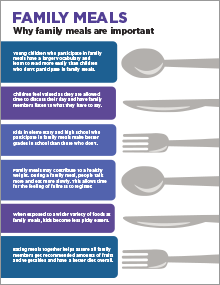New
Editor’s note
You can read this publication on this page, download the PDF, or order printed copies.
See the companion publication N1000, Family Meals Poster.

This handout discusses why family meals are important and how they help children develop healthy habits.
The printed version is a two-page 8.5-by-11 inch handout.
See handout content below.
Family Meals
Why family meals are important
- Young children who participate in family meals have a larger vocabulary and learn to read more easily than children who don’t participate in family meals.
- Children feel valued as they are allowed time to discuss their day and have family members listen to what they have to say.
- Kids in elementary and high school who participate in family meals make better grades in school than those who don’t.
- Family meals may contribute to a healthy weight. During a family meal, people talk more and eat more slowly. This allows time for the feeling of fullness to register.
- When exposed to a wider variety of foods at family meals, kids become less picky eaters.
- Eating meals together helps assure all family members get recommended amounts of fruits and vegetables and have a better diet overall.
Help your child develop healthy habits
Parents are the most influential people on children’s health habits. Making healthy choices for meals helps keep the family healthy and teaches your child important life lessons.

- Mealtime is family time. Keep screens turned off.
- Sweet foods are fine in moderation but should never be offered as a reward. It can make children think those foods are more valuable.
- Let your child create their own snacks with healthy foods you provide.
- Lead by example: Eat the foods you want your child to eat. Let your child witness you trying new foods.
- Be active with your children. Kids need at least one hour of moderate physical activity every day.
- Honor children’s eating cues. If they say they are hungry, offer a healthy snack. If they say they are full, allow them to stop eating.
- At the grocery store discuss all the different foods you see. Let your child choose a new food to try.